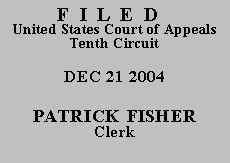

Andrew Sean Leahy, a state prisoner at the Sterling Correctional Facility in
Sterling, Colorado, filed a §1983 action(1) on December 11, 2003, alleging Dr.
McCallon of the Buena Vista Correctional Facility violated his Eighth
Amendment rights by acting with deliberate indifference toward his medical
needs while he was in Dr. McCallon's care in September, 2001. On February 24,
2004, the magistrate judge, to whom the matter had been referred, ordered Leahy
to file an amended complaint in order to (1) clearly and concisely set forth his
claims and (2) demonstrate he exhausted his administrative remedies for each
claim asserted. On March 25, 2004, Leahy filed his amended complaint. On
April 16, 2004, the district court dismissed Leahy's complaint for failure to
exhaust administrative remedies pursuant to 42 U.S.C. § 1997e(a). Specifically,
the court concluded Leahy waited more than two years before filing a grievance
against Dr. McCallon, well beyond the thirty days allotted for filing a grievance
with corrections officials.
Leahy then filed a notice of appeal from the decision dismissing his
complaint and an application to take his appeal in forma pauperis. See 28 U.S.C.
§ 1915; Fed. R. App. P. 24. On July 6, 2004, the district court certified the
appeal was not taken in good faith because Leahy had "not shown the existence
of a reasoned, non-frivolous argument on the law and facts in support of the
issues raised on appeal." (R. Doc. 16.) Therefore, it denied the application to
proceed in forma pauperis. See 28 U.S.C. § 1915(a)(3) ("An appeal may not
be
taken in forma pauperis if the trial court certifies in writing that it is not taken in
good faith."). Leahy renews his application for leave to proceed in forma
pauperis in this court and also seeks appointment of counsel. Reviewing de novo
a district court's finding of failure to exhaust administrative remedies under 42
U.S.C. § 1997e(a), Jernigan v. Stuchell, 304 F.3d 1030, 1032 (10th Cir. 2002),
and exercising jurisdiction under 28 U.S.C. § 1291, we affirm.
Having reviewed Leahy's opening brief, we, like the district court, cannot
discern a reasoned, non-frivolous argument on the law and facts in support of the
issues he raises on appeal. We are at a loss as to why we should excuse Leahy's
complete lack of diligence in filing a grievance against Dr. McCallon (or any
other corrections official) given his allegation he suffered a serious injury
requiring surgery.
Accordingly, we AFFIRM the order of the district court dismissing
Leahy's complaint. We DENY Leahy's application to proceed in forma
pauperis
and motion for appointment of counsel. Leahy is ordered to pay the full appellate
filing fee within twenty (20) days of this order.
Entered by the Court:
Terrence L. O'Brien
United States Circuit Judge
*.This order and judgment is not binding
precedent except under the doctrines of
law of the case, res judicata and collateral estoppel. The court generally disfavors
the
citation of orders; nevertheless, an order may be cited under the terms and conditions of
10th Cir. R. 36.3.
1.42 U.S.C. § 1983 (civil rights action
against state actor).
ANDREW SEAN LEAHY,
Before SEYMOUR, LUCERO, and O'BRIEN,
Circuit Judges.
After examining the briefs and appellate record, this panel has determined
unanimously that oral argument would not materially assist the determination of
this appeal. See Fed. R. App. P. 34(a)(2); 10th Cir. R. 34.1.9(G). The case is
therefore ordered submitted without oral argument.
Click footnote number to return to corresponding location in the text.
![]() | Keyword |
Case |
Docket |
Date: Filed /
Added |
| Keyword |
Case |
Docket |
Date: Filed /
Added |
![]() (12841 bytes)
(12841 bytes)
![]() (8267 bytes)
(8267 bytes)
Comments to: WebMaster,
ca10 [at] washburnlaw.edu.
Updated: December 22, 2004.
HTML markup © 2004, Washburn University School of Law.
URL: http://ca10.washburnlaw.edu/cases/2004/12/04-1216.htm.